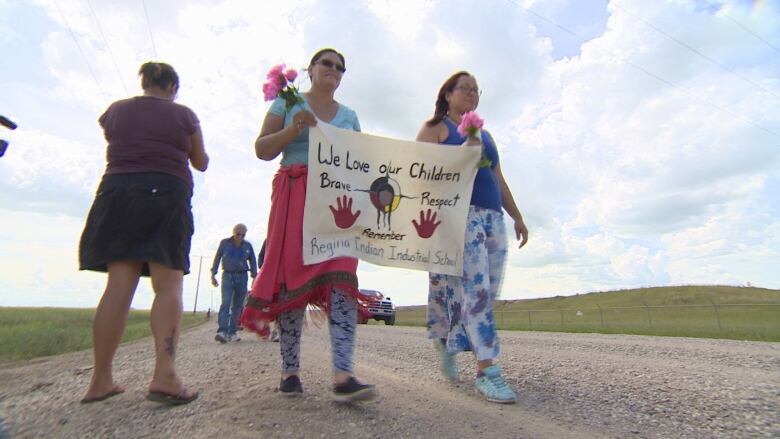Cemetery walk honours children lost to Regina Indian Industrial School
It's believed there may be as many as 40 children in unmarked graves at the cemetery site

People walked to the site of a cemetery on the outskirts of Regina on Wednesday to honour the memory of up to40 children believed to be buried there in unmarked graves.
The event is the 3rd Annual Memorial Walk for the Children andthe cemetery is near the site of the old Regina Indian Industrial School.
Starting in 1890, many First Nations children from across the province were taken from their homes and educated at the Regina Indian Industrial School, which shut down in1910.
The building then became a jail and a boys' detention centre beforeitburneddown in 1948.
Site preservation
The Regina Indian Industrial SchoolCommemorativeAssociation works to help plan the walkand their mandate is to protect andcommemoratethe cemetery on Pinkie Road.
Theyhave been working to have the cemeterydesignated as a heritage site and to have a memorial stone put up on the land.
City officials were present at the walkand organizers said that negotiations are underway to have this site designated as a heritage site.

Janine Windolph is the president of the Regina Indian Industrial SchoolCommemorativeAssociation. She said that the purpose of the work is to bring awareness to the children buried there and the legacy of residential schools.
"Because they weren't given their proper ceremonies and the site isn't protected, it leaves them at danger to be forgotten," said Windolph. "What we really want to do is make sure that doesn't happen."
"Even if it's a dark chapter of our history, it's an important history to remember because it is a legacy, these are ancestors to many people who live in Regina and surrounding."
Lisa Bigeagle-Dustyhornfirst initiated the walk three years ago. She said that, as a mother, she was saddened to learn of the unmarked grave site.
"I'm a mom of 12 children," said Bigeagle-Dustyhorn. "When I heard about the children there it just broke my heart."
She said when she first visited the site, she was saddened to see overgrown grass and weeds, and no markers on the graves.
"I was like something needs to be done, and I'll do whatever I can as a mother to protect them, to protect that site, to get it recognized."
Reconciliation
Organizers said that having this landofficially recognized and commemorated is an important step towards reconciliation.
"We need to do it together, and that's the important part is reconciliation really means creating authentic relationships with each other," said Windolph.
Windolph said that, with the site as it is currently, it leaves an open wound.
"It's like an unresolved past, so if we can resolve it together we can do a lot of healing."













_(720p).jpg)


 OFFICIAL HD MUSIC VIDEO.jpg)
.jpg)



























































































